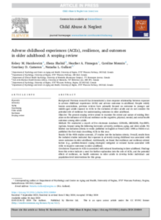Background:
Previous research has demonstrated a dose-response relationship between exposure to adverse childhood experiences (ACEs) and adverse outcomes in adulthood. Despite widely known associations, previous reviews have primarily focused on outcomes in younger and middle-aged adults exposed to ACEs to the exclusion of older adults and do not consider the potential role of resilience for understanding outcomes in older adulthood.
Objective:
The present scoping review aimed to examine the extent and nature of existing literature on the influence of ACEs and resilience on the cognitive, physical, mental, and social health outcomes among older adults.
Methods:
The authors conducted a search of five electronic databases (CINAHL, MEDLINE, PsycINFO, AgeLine, Scopus) using the following keywords: adversity, resilience, aging, and older adults. They limited their inclusion criteria to works published in English or French after 1998 as Felitti et al. published the first study describing ACEs in this year.
Results:
Of the 4926 studies screened, 27 studies met the inclusion criteria. Overall, results from the included studies indicated that exposure to adversity during childhood was associated with worse outcomes in older adulthood. Additionally, they found that resilience and resiliency-related factors (e.g., problem-focused coping strategies) mitigated or reduced harms associated with ACEs to improve outcomes in older adulthood.
Conclusions:
Exposure to ACEs is associated with reduced functioning in later adulthood. Findings from this review indicate a need for further exploration into the role of ACEs, and the potential effects of resilience, on health outcomes in older adults to develop better individual- and population-level interventions for this group.

